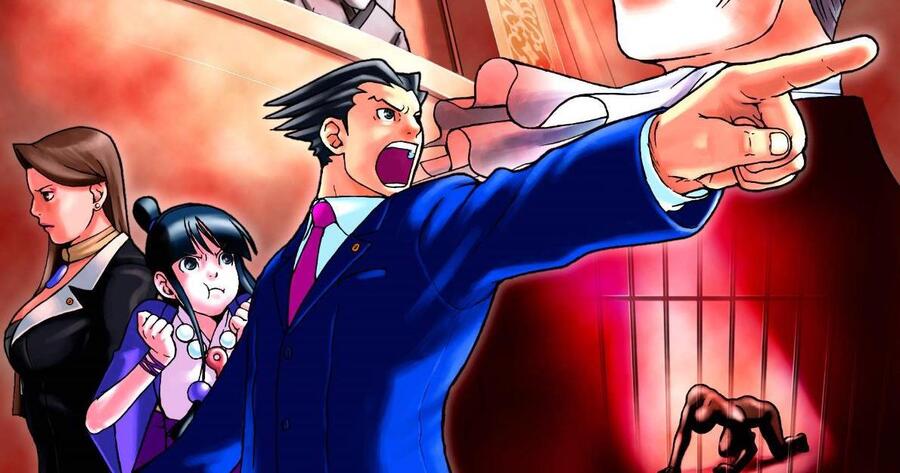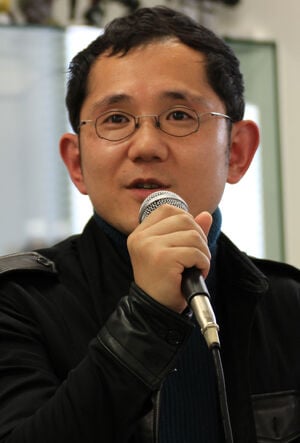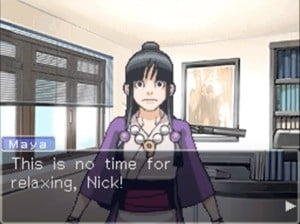
It's hard to imagine now, given the incredible popularity of the Phoenix Wright: Ace Attorney games in the West, but it wasn't always a given that Capcom was going to release the series outside of Japan.
Back when Capcom launched the very first version of Phoenix Wright: Ace Attorney for the Nintendo Game Boy Advance in 2001, in fact, the developer/publisher notably skipped out on launching the game outside of the country. Then, later on, during the development of its 2005 Nintendo DS remake, it almost reached the exact same decision again, believing that an adventure game about an Japanese defence attorney wouldn't sell well enough outside of Japan to turn a profit, especially with the money it would take to translate its lengthy script into English, and the cost of marketing and manufacturing.
Nevertheless, thanks to some internal championing within its US branch, it did eventually end up reevaluating this decision when it came to this later release, outsourcing the job of translating the formerly Japan-exclusive game to Bowne Global Solutions, a localization company that today falls under the ownership of Lionbridge.
With the 20th anniversary of the Nintendo DS version of the game taking place this year, in both Japan and North America, I wanted to take a deeper dive into the circumstances surrounding the game's initial localization, so I decided to try and reach out to those who were originally responsible for bringing Phoenix Wright to the West. This included the veteran translator Alexander O. Smith and the former project manager at Bowne Global Solutions Steve Anderson, who were part of the team tasked with introducing English language audiences to the game's characters.

Fortunately, for me, both were willing to share their memories, not only filling me in on how they initially became involved with the project, but also offering some great insights into the behind-the-scenes decision-making that took place, their thoughts on the localization process as a whole, and what they feel they could have improved given what they know today. Without further ado, then, let's dive in and go through some of the amazing stories they shared with us, to learn more about everyone's favourite video game attorney and their eventful overseas adventure.
As Anderson told me, Bowne Global's involvement with localizing the game began in September 2004, when Capcom requested the company provide a sample translation. At this stage, it still wasn't clear whether or not the project would go ahead, with Capcom still questioning internally whether it was worth the gamble.
He recalled, "We provided the sample, but Capcom was initially uncertain about whether they would move forward with a global release. With several staff there championing the project, though, we eventually got the greenlight to start working on the full localization around mid-November that same year.
"My role was to coordinate the translation from the initial trial to the final delivery, handling scheduling and liaising between the translators and Capcom (though much of the formal communication went through our in-house sales rep, Yuli Kim, and project manager, Yoko Muto). I also edited the translations, and applied feedback from Capcom after our initial submissions for each case."

While Anderson became involved with the project on account of his job at Bowne Global, Smith was a slightly different story.
At the time, he was a freelance localization expert living in Japan who already had a great reputation in the industry, thanks to his involvement in localizing several Squaresoft titles like Vagrant Story, Final Fantasy VIII and IX, as well as the Nintendo strategy game Fire Emblem. Bowne Global Solutions approached him early on in the process, believing he had the necessary skills to take on a project of this scale, and hit the deadlines it had been given.
"I had done work for Bowne Global years earlier," said Smith, "And I knew people there like Steve Anderson. So I think I was on their list. At the time, I remember Phoenix Wright being described to me as kind of a throwaway game for Capcom because they were pretty sure it was not going to do well. I know they only did a limited run of units for the first run.
"That's probably why they outsourced it to begin with, because they definitely had a localization team in-house. If it had been one of those titles that they were putting a lot of energy into, you'd figure they'd keep it in-house. But I think, in this case, they were happy to let that one just kind of go out and I just so happened to be available to do it between projects."
Smith would become the main translator for majority of the project (cases 1 to 4), and would also be involved in the discussions surrounding the naming of characters, including the central protagonist whose original Japanese name was "Naruhodo" (なるほど). This was something that proved especially important for Capcom at the time, as unbeknownst to both Bowne Global Solutions and Smith, it was intending to change the original Japanese name of the game Gyakuten Saiban (逆転裁判, literally "Turnabout Trial") to include the name of its main character in the title.
Naruhodo, in case you're unfamiliar is a Japanese term that literally translates to "I see", and is used as a pun in the game, essentially poking fun at Wright's inexperience and his tendency throughout the game to find himself being corrected or to completely misread the situation. So, according to both Anderson and Smith, the idea was to adapt this bit of wordplay to English, with the surname "Wright" as in "Right" being decided as early on as the original translation sample. The first name, however, took a bit longer to manifest with Smith actually suggesting a completely different name than Phoenix, which he used for much of the game's development.
"My favorite name was Roger Wright," said Smith. "Because his name in Japanese, Naruhodo, means 'Oh, I get it'. There were jokes based his name being "Naruhodo" and if his first name was Roger, then people could say 'Oh Roger, right!' and he could be like 'What?' You could keep the joke pretty much the same. But I remember hearing the director or the writer of the first one didn't like Roger Wright, because in Japanese it sounded way too close to Roger Rabbit."
Asked about the name, Anderson elaborated, "Capcom felt it was too plain (we weren’t aware they were considering using his name in the title at that point). But yeah, it probably didn’t help that it was close phonetically to Roger Rabbit when transliterated to Japanese. They wanted something unique and compelling to both English and Japanese audiences, because I believe they were planning to include the English localization as a bonus in the Japanese release. We went through several rounds of proposing at least a dozen alternates after that (Xavier, and Pierce come to mind), but Phoenix ended up being the one they liked best.
He continued, "'Phoenix' was a name we’d previously considered but hadn’t proposed to Capcom in the first few rounds of candidates. I liked how the image of a phoenix rising from the ashes paired with the 'comeback' theme of the game, but we initially felt it was a little TOO “unique” and it didn’t have a natural nickname associated with it, which the dialog required. I threw it back into the mix after multiple rounds of other name ideas failed to gain any traction, and that’s the name that Capcom ultimately chose, cleverly suggesting 'Nick' as the nickname to pair with it."

Choosing a new name for the character obviously proved to be a bit of a struggle, but it wasn't the only challenging aspect of the translation, with the sheer amount of text, the abundance of jokes/wordplay, and the limited screen size upping the difficulty of the translation significantly. As a result, Smith embarked on marathon writing sessions, trying to get as much done, with the aim being to stay as true as possible to the original's intent while also attempting to creating something that would be entertaining to a Western audience, using himself as the stand-in for the player.
Smith recalled, "Essentially, I was just trying to make myself giggle. Because you have to like hit some sort of bar or set a goal or a target audience. So I was like, 'If I think it's funny, it's gonna be good enough' because there was nothing else to go on at the time. I was literally sitting in the Starbucks about a 10-minute walk away from where I lived in Japan at the time. And I would go there every morning at 9 a.m., and like pull out my laptop and then work until noon. If I had gotten through like 9000 characters by noon, I knew it would be a good day. If I hadn't, I knew it would be a sucky day. That was the limit of my market research for this."
To give an example of the kind of choices he would have to make during these writing sessions (and how he would have to adapt certain lines for English), he brought up a now famous saying uttered by Phoenix Wright about his childhood friend, Larry Butz, which served as an illustration of how the game tried to retain the same kind of humour while making changes to the original text.
"So in Japanese, Larry Butz's name is Yahari Masashi (矢張 政志)" Smith told me. "And Yahari (やはり) is a polite way of saying, 'I knew it' or 'Of course!' and it can often be said, 'Yappari' (やっぱり) for emphasis. So when Naruhodo is introducing the character he says, 'Yahari Masashi was my best friend since grade school' and then his next line is basically, 'People have been saying for the last 23 years, 'Behind every incident, of course, it's Yahari''.
"To create something similar in English, we obviously changed his name. And then, you'll notice, we also had to leave out the 23 years from the line in order to get the whole thing in as there was very limited screen space. But the next line in Japanese was 'He's always like caught up in some rough business', so we could move that part there: 'In the 23 years I've known him, it's usually been true.'"
There's also just kind of a general difference in the way that Japanese and English people like to write jokes. Japanese joke writing (and this is true especially in regards to the way that Phoenix Wright is written) has a lot of little jokes along the way slowly building up, but there's often not a punchline, whereas, in English, people really like a good punchline.
"So you move things around, and sometimes you move whole jokes around, because you can't make it land in one particular place. There's also just kind of a general difference in the way that Japanese and English people like to write jokes. Japanese joke writing (and this is true especially in regards to the way that Phoenix Wright is written) has a lot of little jokes along the way slowly building up, but there's often not a punchline, whereas, in English, people really like a good punchline. And so sometimes we kind of forced a punchline by just rearranging the elements of a sentence."
Another notable example Smith shared where he had to "move things around", in this manner, is in regards to the character Redd White, one of the suspects in the second case, "Turnabout Sisters".
In the original Japanese, White's name is "Masaru Konaka", with the Kanji for his name "小中 大", meaning "small, medium, large". He is introduced to us as the president of a company called Kona Culture (コナカルチャー) and has a predilection for using a lot of foreign words to make him seem more intelligent or worldly, represented through the use of katakana.
Here, obviously, it wouldn't be possible to translate this literally without using footnotes to get this characteristic across in English, so there were some fairly extensive changes made, in the service of making the character land in a similar way. His name, for instance, was changed to Redd White, with the company name being altered to Bluecorp, with the colours red, white, and blue giving the impression of a hyper-confident American businessman. Smith, meanwhile, peppered his dialogue with made-up vocabulary, including words like "ridiculosity", "splendiferous", and "inquirably" — all of which were designed to show that Redd had a tendency of trying to make himself sound smarter to those he meets.
Reflecting on these types of changes, Anderson told me, "The game could have been localized in a way that preserved the Japan location and Japanese characters, but without the punny names and references that a Western audience could immediately relate to, it would probably have had a very different feel. Sometimes being overly faithful to the Japanese text can negatively affect the player experience.
The game could have been localized in a way that preserved the Japan location and Japanese characters, but without the punny names and references that a Western audience could immediately relate to, it would probably have had a very different feel.
He continued, "I think that Capcom felt that preserving the fun, immediately engaging feel of the Japanese original was the best way to develop an overseas audience for the series. So having to work in dry explanations of Japanese terms and references would likely have detracted more than it added."
In the majority of cases, the English-speaking audience for the game are completely oblivious that any significant change has taken place, but in others, it is slightly more difficult to ignore. This was undoubtedly the case with the character Sal Manella, who is the director of the film, The Steel Samurai, that appears in the game's third episode "Turnabout Samurai".
Sal's name in Japanese is Takuya Uzai (宇在 拓也), with his first name being chosen for its similarity to the word "Otaku" (おたく), often used to describe anime and manga obsessed fans, while his family name is "Uzai" that translates to "annoying". This gives him a name that essentially translates to "annoying nerd". He is a character that, in the original, speaks in a style that is similar to the Japanese version of netspeak, often punctuating his own sentences with little parentheticals, typically giving an insight into his mood almost like emoticons. This includes using "do" (怒) to indicate when he's angry, or "baku" (爆), which is similar to phrases like "LOL" or "ROFL", to express when he finds a situation humorous.
To try and communicate this in English, the team, therefore, felt the best way to approach the problem was to have the character speak in "leetspeak" (Or "1337" speak), a form of internet slang that would similarly help get across the fact that the character spends way too much time on online forums. That is how we arrive at some of the localization's more awkward or dated dialogue, such as "I make teh L33T SHOWZ! The Steel Samurai? Mine! RTFC! (Read The Film Credits!)" or "Hey, do j00 do a lot of ‘cosplay,’ coz that costume r0x0rz!…”, which are more stylistically removed from the literal translation. In retrospect, this isn't something that the team told me they necessarily regret. But it's definitely one aspect of the game that they now acknowledge is pretty of its time.
"Some choices, like Sal’s '1337' speak, may also make the game feel more dated today," said Anderson. "Though I wouldn’t go so far as to say I regret that direction, as scenes like Maya misunderstanding r0x0rz as “rock sores” tickled my funny bone at the time, and I don’t know if a safer, more sterile localization could have captured that."
Based on this reaction, it's probably a good time for us to move on to one of the largest and most controversial decisions Capcom and the localization team made for Phoenix Wright: moving the location of the game from Japan to the US.
In the original Gyakuten Saiban, the setting was clearly based on Japan, with much of the character designs, architecture, and cultural references lining up with a Japanese setting. However, in Phoenix Wright: Ace Attorney, Capcom and the localization team decided to move the events of the game to Los Angeles, which ultimately brought further changes to the text to American-ize it for Western audiences. This included changing one character's accent from an Osaka dialect to a southern accent and altering another character's favourite food elsewhere from ramen to hamburgers, to fit in line with the new setting.
This is a change that has since become the source of many jokes online, with fans subsequently dubbing the game's version of Los Angeles "Japanafornia" due to the strange mix of Japanese and American influences. But why exactly was this change made in the first place?
I asked Smith and Anderson for their memories of how this decision was reached, and, according to them, much of the blame seems to be laid on the very first case in the game, which is titled "The First Turnabout".
In this case, in case you aren't familiar, Phoenix is tasked with defending his old school friend Larry Butz, who has been accused of murder, with one of the major pieces of evidence that is eventually used to catch the real killer being a clock that is set to a different time zone.
As a result, rather than leave the setting ambiguous (as they had originally intended), they were essentially forced to make a decision over where the game would be set, with Capcom ultimately deciding that it would be better for the long-term future of the series for it to be based in the States, to appeal to a wider audience.
"It was essentially San Fransokyo before San Fransokyo was a thing," said Smith, reflecting on this decision now. "It was this sort of vaguely West Coast place with a lot of Japanese influences. Little did we know, though, that subsequent episodes in the series would lean hard into Japanese culture, which made that choice we made in the first one completely ridiculous."
Because of some of the stylistic and artistic changes made to the original Phoenix Wright localization online today, it can sometimes feel a little like walking into a proverbial minefield to talk about the game online, as it's clear there are lot of people with very strong opinions about the overall quality of the finished product. While there are some who consider the Western version of the game to be "a feat of localization" or a charming adaptation that is a little bit clumsy or dated in places, there are others online who are far more critical, arguing that this style of localization is an attack on the integrity of the author's original vision.
With these same kinds of debates still likely raging today in some far flung corner of the internet, I wanted to go direct to the source and see how Smith and Anderson viewed their own work today, having had some decades now to think things over. First up was Smith, who seemed to still be amused at many of the jokes and names he had created for the game, but suggested, like always, there are a few areas where things could be better, if the realities of the project had been different.
"I think we made the best decisions we could with the information we had at the time," says Smith, "It could always be better. But I could have also had 10 times the amount of time to work on it and they could have paid me 10 times the amount of money. That didn't happen. So you're always doing things in the constraints of real life and it's impossible to look at the work without understanding the realities. If we had just gone out on a limb and said something like, 'No, we're setting it in the West because 'Screw Japan' or whatever our motivation would be to do that, I would probably feel bad about it now. But that was never the case."
As for Anderson, he argues the project is one of the rare localisations he can actually look back on with satisfaction despite some of the clumsier decisions that were made, praising several of his collaborators, including the localization team at Capcom, and the game's translators, Smith and Philip Soldini (who was responsible for localizing "Rise From The Ashes" after Smith had to leave the project prematurely) for what they were able to achieve in bringing the series to an overseas audience.
"Personally, I’m rarely fully satisfied with a localization I work on," said Anderson. "Because there’s always the sense it could have been done better with more time or resources. That said, I have a particular fondness for the Phoenix Wright localization even all these years later.
He continued, "Ultimately, I feel fortunate to have been able to contribute to a series that has come to mean so much to its fans, and to have had the chance to work on a game that embraces humor in the spirit of the classic point-and-click adventure games I loved as a kid, like Day of the Tentacle and the Monkey Island series. A couple of decades later, I still find myself returning to 'Japanafornia' to enjoy the crazy antics of its characters every now and then."




